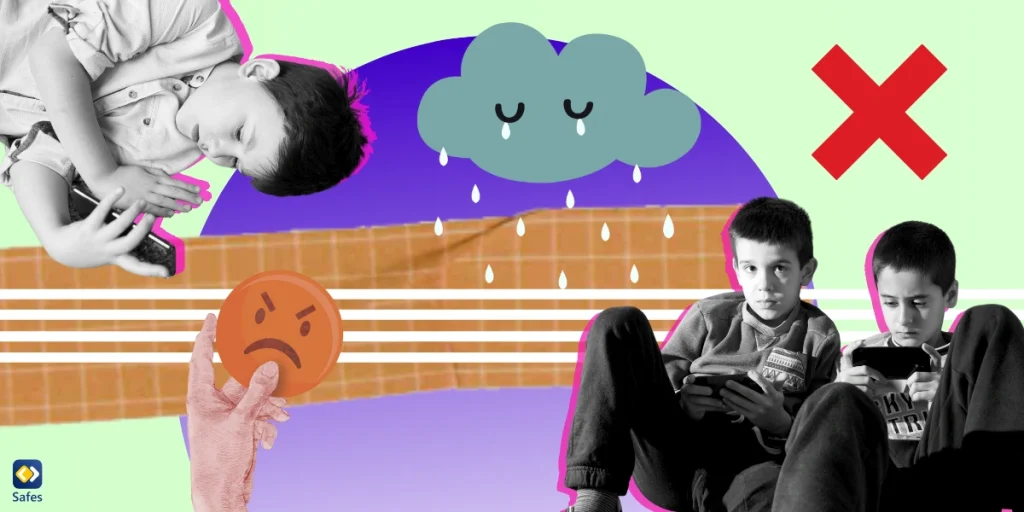How we behave and interact online can profoundly impact our relationships, reputation, and even future opportunities. So, instilling a solid foundation of online etiquette in our children is crucial not only for their personal development but also for their success in the digital realm.
Download and Start Your Free Trial of the Safes Parental Control App
As parents, we must prioritize teaching our children about internet etiquette. By instilling these crucial values, we empower them to navigate the digital landscape responsibly, fostering positive relationships and safeguarding their online reputation. Join us as we explore the 13 essential online etiquette rules every parent should teach their child, ensuring their success in the digital world and beyond.
What Does Digital/Online Etiquette Mean?
Digital/online etiquette, also known as netiquette (short for internet etiquette), is a set of rules and guidelines that govern proper behavior and communication when interacting with others in the digital space. It encompasses respectful and considerate online behavior, thoughtful communication, healthy relationships, and gracefully navigating conflicts. Digital etiquette also emphasizes the importance of protecting one’s online reputation and being mindful of one’s digital footprint.
Why Is Netiquette Important?
Teaching kids about netiquette is essential as it equips them with the necessary skills to navigate the digital landscape responsibly and respectfully. Just as we teach our children good manners in the offline world, imparting these essential digital etiquette skills is equally important. By instilling the values of thoughtful communication and maintaining healthy relationships online, we empower kids to build positive connections and navigate potential conflicts with grace.
Moreover, netiquette rules have a significant impact on a child’s online reputation. Kids need to understand that their words and actions in the digital realm can reach a wider audience instantaneously and have long-lasting consequences. By emphasizing the importance of protecting their online reputation and being mindful of their digital presence, we lay the foundation for responsible digital citizenship.

What Are Some Examples of Bad Digital Etiquette?
Before going on to tell you what’s proper online etiquette for children, we have to give you some poor digital etiquette examples:
Cyberbullying: Engaging in online behavior that intentionally harms or harasses others, such as sending mean messages or spreading rumors.
Over-sharing personal information: Sharing sensitive details like full names, addresses, or phone numbers without considering the potential risks and consequences.
Disrespecting others: Disregarding basic online etiquette guidelines, such as using proper language or respecting others’ opinions.
Trolling: Purposefully posting provocative or offensive comments to provoke reactions and create conflicts with others.
Disregarding privacy settings: Sharing or viewing content without permission, invading others’ privacy, and violating the boundaries set by social media platforms.
Online gossiping: Participating in spreading rumors or engaging in conversations that involve discussing private matters about others without their consent.
Digital exclusion: Deliberately excluding others from online activities, group chats, or social media platforms, causing feelings of isolation and exclusion.
Lack of empathy: Failing to consider the feelings and perspectives of others when communicating online, leading to misunderstandings and conflicts.
13 Online Etiquette Rules Every Child Should Know
In the following, we will discuss 13 essential online rules that every parent should teach their child. These rules will empower children to build positive connections, navigate conflicts, and safeguard their online reputation. By understanding and following these rules, children will develop a sense of responsibility and empathy in the digital space.
Let’s dive into the 13 online etiquette and safety rules that parents should prioritize when teaching their children about responsible digital behavior and the definition of online etiquette.
Rule 1: Respect Others’ Privacy
The first rule of online etiquette is to respect others’ privacy. Children should understand the importance of not sharing personal information without permission, such as addresses, phone numbers, or passwords. They should also be aware of the risks associated with sharing private information and the potential consequences it may have for themselves and others.
Rule 2: Think Before You Post
Teaching children to think before they post is crucial. They should understand that once something is shared online, it can be challenging to remove or control its distribution. Encouraging them to consider the potential impact of their words and actions before hitting the send button will help them become more mindful digital citizens.
Teaching your child to avoid sexting or any other risky behavior online that can jeopardize their character and safety is also incredibly important. Not only does sending nudes put children at risk of coming into contact with dangerous people, but also, the pictures and videos that they share online may stay there forever and be used against them.
Rule 3: Be Kind and Respectful
Online interactions should be conducted with the same kindness and respect as face-to-face conversations. Kids need to understand that their words can have a lasting impact on others, and treating others with empathy and respect is essential. Teaching them to avoid cyberbullying, offensive language, and derogatory remarks will foster a positive online environment.
If your child has started dating, there will be specific etiquette rules for such a context. In the case of online dating, chat etiquette is important. Teaching your child about proper online dating texting etiquette might help them even in their adult life.
Rule 4: Use Appropriate Language and Tone
Children should be taught to use appropriate language and tone when communicating online. They should understand that using all caps or excessive exclamation marks can be perceived as shouting or aggressive behavior. Encouraging them to express themselves in a calm and respectful manner will lead to healthier online conversations.
Rule 5: Avoid Trolling, Bullying, and other Negative Behavior
Trolling, which means intentionally provoking or harassing others online, should be strictly discouraged. According to a study by WHO, one in six school children experiences cyberbullying. Also, teach your child empathy so they understand that cyberbullying someone is just as awful as being cyberbullied. Children should be prepared to avoid harmful behavior and instead focus on constructive discussions.
Rule 6: Be Mindful of Digital Footprint
Children need to understand that their online actions leave a digital footprint that can be traced back to them. Reminding them that teachers, peers, or even people they’ll meet in the future may evaluate their online presence can encourage them to think twice before engaging in inappropriate or harmful behavior. Children can protect their online reputation by being mindful of their digital footprint.
Rule 7: Respect Copyright and Intellectual Property
Educating children about respecting copyright and intellectual property is crucial in a digital environment where sharing and copying content is prevalent. Children should be aware of the importance of giving credit to the original creators and seeking permission when using someone else’s work. This fosters a culture of respect for creativity and intellectual property rights.
Rule 8: Use Proper Netiquette in Online Gaming and Chatting
Online gaming has become a popular form of entertainment for children, and they need to understand the specific netiquette rules that apply in gaming communities. They should be taught to communicate respectfully, follow game rules, and avoid cheating or exploiting others. Also, teach your kid to avoid disrespecting or bullying others while playing games or chatting in online chatrooms.
Rule 9: Be Inclusive and Accepting
Online exclusion and discrimination are significant issues that children should be aware of. Parents should encourage their children to be inclusive and accepting of others, regardless of race, gender, ethnicity, or beliefs. By fostering an environment of inclusivity, children can contribute to a more diverse and tolerant online community.
Rule 10: Be Aware of Online Scams and Safety
In the US, in 2024, most online scams against children were performed through social media, text messages, and emails. Scammers are constantly finding new ways to trick unsuspecting individuals, including children, into sharing personal and sensitive information. Scams can lead to identity theft, financial loss, and even emotional distress. To stay safe online, children should be taught to never share personal information such as their full name, address, phone number, or any financial details with strangers they meet online. It’s essential to emphasize that reputable organizations and companies never ask for this information through unsolicited messages or emails.
Children should also be cautious about clicking suspicious links or downloading files from unknown sources. These can contain malware or viruses that can compromise their devices and personal information. Encourage them to only click on links or download files from trusted sources.

Rule 11: Balance Screen Time and Real-Life Interactions
It’s crucial to strike a healthy balance between online and offline activities, especially for children. While the internet offers numerous opportunities for learning, socializing, and entertainment, it’s equally important for children to engage in face-to-face interactions and offline hobbies. Doing this will help them develop essential life skills, maintain their physical and mental well-being, and foster a sense of connection with the real world.
Spending excessive time online can lead to a sedentary lifestyle, poor physical health, and a lack of social skills. When children spend too much time in front of screens, they may miss out on important opportunities for physical activity, face-to-face interactions, and building meaningful relationships. Additionally, excessive online activities can negatively impact their attention span, creativity, and cognitive abilities (for more information, refer to Exploring the Impact of Internet Use on Memory and Attention Processes, a research paper published in the International Journal of Environmental Research and Public Health).
Face-to-face interactions play a vital role in children’s social and emotional development. Through direct communication, they learn crucial skills such as empathy, active listening, non-verbal cues interpretation, and conflict resolution. These skills are essential for building healthy relationships, both online and offline. Children develop a sense of belonging and connection with others by engaging in face-to-face interactions, fostering their overall well-being.
Rule 12: Avoid Age-Inappropriate or Harmful Content
The internet is filled with a vast range of content, and not all of it is suitable for young eyes and minds. Exposure to age-inappropriate material can have a detrimental impact on a child’s emotional and mental well-being. It can lead to confusion, fear, and even distorted perceptions of the world around them. By instilling the value of avoiding such content, we equip our children with the tools to make responsible choices and protect their innocence.
Additionally, shielding children from harmful content is crucial to their overall development and nurturing a healthy online presence. Exposure to violent or explicit material can desensitize young minds and normalize negative behavior. By teaching them to discern what is appropriate for their age, we encourage them to cultivate positive digital habits and contribute to a safer and more respectful online community.
You can help your child avoid age-inappropriate content with the help of parental controls, whether it be the default parental controls on Android devices or iPhone parental controls. These tools can help filter content to make the device safer for your child.
Rule 13: Seek Help and Report Inappropriate Behavior
Lastly, children should be taught to seek help and report inappropriate online behavior. They should know whom to reach out to, whether it be a trusted adult, teacher, or online platform administrator if they witness or experience cyberbullying, harassment, or any form of online abuse.
Reporting suspicious activities is crucial in protecting oneself and others from online scams. Encourage your child to report any suspicious messages, emails, or websites to a trusted adult or the appropriate authorities. This helps to prevent others from falling victim to the same scams.
Conclusion
Teaching children about online etiquette, or netiquette, is essential to their digital upbringing. By imparting these 13 online etiquette rules, you can equip your child with the knowledge and skills to navigate the online world responsibly. Using parental control apps can make a big difference since such tools can be used to give positive or negative feedback. For example, a parental control app like Safes Family can filter keywords or block entire websites. It can even set screen time limits for each individual app setting a schedule for the day. To experience the features of Safes Family for yourself, sign up for it’s free trial now! Safes Family is available for download on iOS and Android.
Remember, teaching kids online etiquette is not much different than teaching them how to behave in the physical world. It takes time and perseverance, and of course, you need to lead them by example.
Your Child’s Online Safety Starts Here
Every parent today needs a solution to manage screen time and keep their child safe online.
Without the right tools, digital risks and excessive screen time can impact children's well-being. Safes helps parents set healthy boundaries, monitor activity, and protect kids from online dangers—all with an easy-to-use app.
Take control of your child’s digital world. Learn more about Safes or download the app to start your free trial today!




